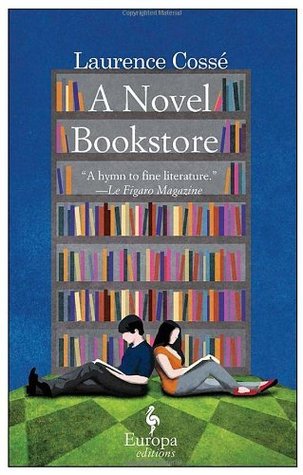What makes a good book a truly "great" book? When does a work of individual imagination and brilliance count as a global literary treasure? And who decides what is good or not?
Laurence Cosse's delightful novel "A Novel Bookstore" attempts to define this for the reader. But in doing so, it opens more questions than it can answer, not only about the process of reading and judging the quality of what one reads (is THIS trash or literature?), but also about the ability of "good" literature to affect our everyday lives in an almost irreparable yet profound fashion. The title of this story is a double-entendre on the main plot device - a bookstore that only sells the best novels in the world. No pulp, no bestsellers, no commercial conveyer-belt products available here, sorry!
Best described as a literary-mystery-romance, the story opens with a fast paced prologue - Three seemingly ordinary people are attacked / terrorized by unknown assailants resulting in one death. What is the connection between these people? Why are they being targeted for assassination? As we look into this mysterious world through the eyes of an unnamed narrator (whose identity is revealed on the very last page), the story unfolds through the intersecting lives of the two main protagonists, Ivan and Francesca - the brains (and hearts) behind the eponymous bookstore.
Ivan is a young bibliophile who is unfortunately, also in the business of selling them. His personal taste often finds itself at odds with his employer's or worse, customer's demands, and he quickly gathers an impressive resume of short stints in various bookstores. It is in one such idyllic store in a ski station that he meets Francesca, a wealthy Parisian with a similar taste in literature and the same passion for disseminating good literature. Plans hatch quickly to open a store that sells only the best novels to their customers. The task of choosing the inventory falls on the shoulders of a committee of eight authors that they both admire. "The Good Novel" opens with the following manifesto:
“We have no time to waste on insignificant books, hollow books, books that are here to please. … We want books that are written for those of us who doubt everything, who cry over the least little thing, who are startled by the slightest noise. We want books that cost their authors a great deal, books where you can feel the years of work, the backache, the writer’s block, the author’s panic at the thought that he might be lost …. We want splendid books, books that immerse us in the splendor of reality and keep us there. …We want good novels.”
The venture opens to great success. Book lovers from far and wide flock to this unique establishment in the search for their favorites. Ivan and Francesca expand their staff, which also includes Ivan's temperamental girlfriend, to accommodate their customers better. Along the way, there are hints of romantic interest, particularly from Francesca's side, but they remain unfulfilled. Trouble brews in the form of a clandestine organization that attempts to malign the name of the new bookstore and its owners. With a media campaign that reeks of wealth, they try to portray the 'discerning' bookstore as 'elitist' and 'totalitarian.' When that fails, they try to skew the inventory by sending in hundreds of bogus customers who order novels that are not in stock, but then fail to pick them up. As a last resort, they attack and intimidate the members of the selection committee.
Do Ivan and Francesca rise above their obstacles and succeed in their dream of providing the best literature to the best readers? Who is this mysterious adversary who wants to bring them down?
Cosse provides a very interesting narrative to a plot whose novelty lies in the execution of a seemingly simple idea. The characters are very well defined, and there are times when this story does not feel like fiction at all. She takes great care to describe the character quirks, clothing, and environs in minute detail. The language is also free-flowing, and the often witty dialogues do not feel forced. However, the book tries to be many things at the same time, and nearly does not succeed. It comes off as a first-rate meta-fiction about literature, but the mystery portion is oversold and undercooked. It tries to draw a parallel between the literary and fictional worlds inhabited by the characters, but the tragedy in the character's lives does not hit home quite as hard since the relationship between Ivan and Francesca is not developed to the extent to make the tragedy a poignant denouement. The parts that are best written invariably involve discussion of books, and those are the passages that stay with you long after the story has concluded.
In all, this is an excellent story that explores the importance of books in our society on an individual as well as societal scale. Very recommended!

